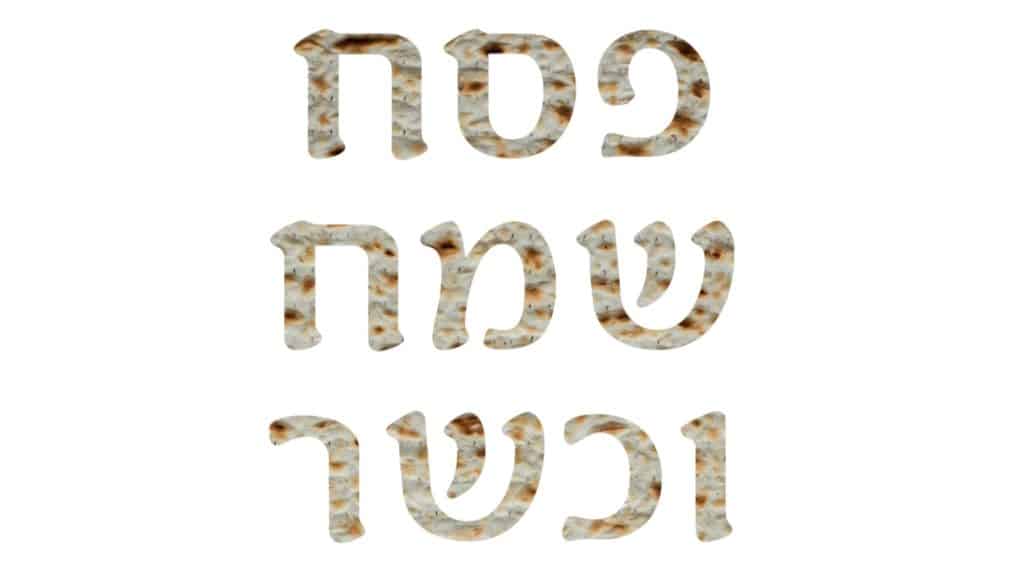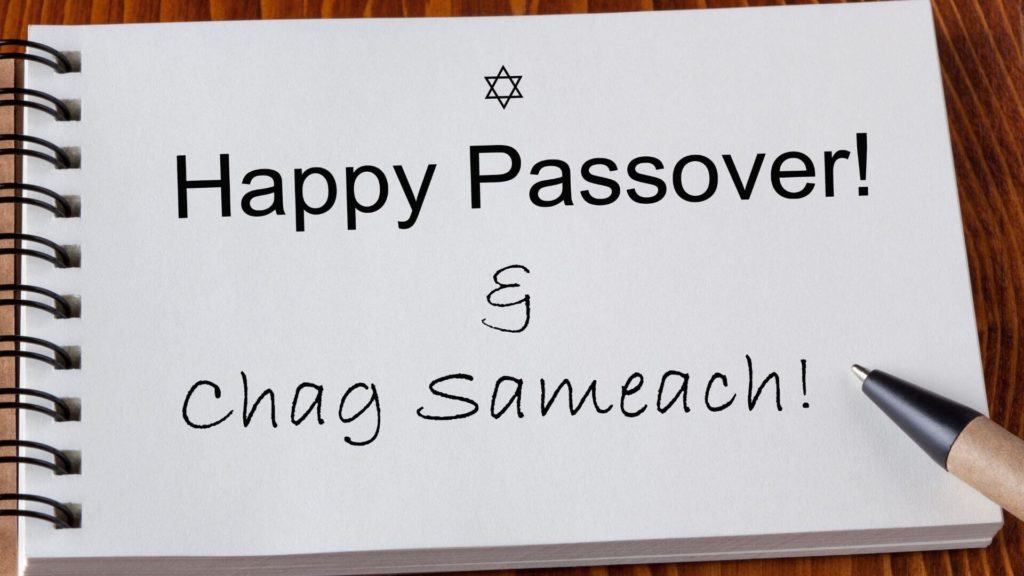Learn How to Say Proper Greetings for Passover
There are a variety of ways to let someone know that you are thinking of them during Passover. And the best part is that you can choose to wish someone a Happy Passover in three different languages: English, Hebrew or Yiddish! Whichever one of the Passover greetings you choose, I’m sure your friends, family, coworker, client, etc. will feel the love.

Passover Greetings in English
Happy Passover
Can you say Happy Passover as a proper Passover greeting? Absolutely!
And you should. Most diaspora Jews (those that live outside of Israel) who do not speak Hebrew as their first language and who are not part of the Orthodox movement will simply say Happy Passover to wish their Jewish friends and family well during the holiday. So, you’ll fit right in if you say Happy Passover too.
Happy Holiday
While you can say Happy Holidays to wish someone well over Passover, I personally don’t this is quite as correct a greeting as saying Happy Passover. Now, if Easter and Passover both fall on the same week as they sometimes do and you aren’t sure if the person is Jewish or not, then I would go with Happy Holidays. Otherwise, I’d stick to Happy Passover.

PSST: If you’re interested in learning more about what prayers to say at each of the holidays, take a look at my new eBook, Book of Blessings for the Jewish Holidays. This 18-page, easy-to-follow guide will help you navigate all the Hebrew prayers for every holiday. Click here to purchase a copy for your home.
How do you say Happy Passover in Hebrew?
There are quite a few ways to wish someone a Happy Passover in Hebrew. The first three that I have listed below are great for those with a beginner level of Hebrew. If you’re feeling comfortable with the Hebrew and really want to show off your skills, you can express your Passover greeting or wishes with the fourth option. I’ve also included audio for all of the Passover sayings.
Passover translates to Pesach (פֵּסַח) in Hebrew. Sameach (שַׂמֵחַ) means happy and Chag (חַג) means holiday. The Hebrew Passover greetings tend to include these three words in varying order.
Chag Pesach Sameach (Happy Passover Holiday)
חַג פֵּסַח שַׂמֵחַ
TRANSLITERATION BMA STYLE: ChAHg PAY-sAHch SAH-mAY-AHch
If I was going to choose one phrase to say to wish someone a Happy Passover in Hebrew, Chag Pesach Sameach would be it. It’s succinct, but still differentiates the fact that you are wishing someone well for Passover specifically and not just any Jewish holiday.
Pesach Sameach (Happy Passover)
פֵּסַח שַׂמֵחַ
TRANSLITERATION BMA STYLE: PAY-sAHch SAH-mAY-AHch
There isn’t a huge difference between this particular Passover greeting and Chag Pesach Sameach, but if you want to use a slightly abbreviated, yet perfectly acceptable version of a Pesach greeting, Pesach Sameach is perfectly okay.
Chag Sameach (Happy Holiday)
חַג שַׂמֵחַ
TRANSLITERATION BMA STYLE: ChAHg SAH-mAY-AHch
Chag Sameach is a more generic way of greeting someone during Passover since you are leaving out the Hebrew word for Passover and saying Happy Holiday. It’s perfectly acceptable though and a common way for many people to share well wishes for the Jewish holidays. In my opinion, you’ve already got a leg up for using Hebrew to greet someone on Passover, so you’ll still impress with this greeting even if it can be used for all holidays.
Chag Kasher V’sameach (Have a happy and kosher festival)
חַג כָּשֵׁר וְשָׂמֵחַ
TRANSLITERATION BMA STYLE: ChAHg KAH-shAYr VEH-sAH-mAY-AHch
Adding the Hebrew word Kasher to your Passover greeting is especially significant because of all the work that goes into making one’s kitchen and food kosher for Passover. Much of the food that is deemed kosher the rest of the year — leavened products, known as chametz, like pasta, bread, cookies, and crackers — are removed from the house on Passover. Matzah, unleavened bread consisting only of flour and water, is eaten instead. If you want to wow someone with your knowledge of Passover and Hebrew, greet them with the words, Chag Kasher V’sameach!
Passover Wishes in Yiddish
Gut Yun Tif or Gut Yuntiff
During the beginning and end days of the Passover festival, we can say this Yiddish greeting. Yom Tov, which literally translates to good day but can also mean festival day, refers to the annual dates on the Jewish calendar in which the Torah prohibits work. However, work is defined somewhat differently for Yom Tov than it is for Shabbat. The exact days that are intermediary vary depending on which Jewish movement you belong to and whether or not you live in Israel. For those living in Israel and Jews living outside Israel that belong to the Reform Movement, Passover lasts for seven days. Yom Tov is on days one and seven. Meanwhile, Passover lasts for eight days for Conservative and Orthodox Jews living outside of Israel. These Jews celebrate Yom Tov on day one, day two, day seven, and day eight of Passover.
Gut Mo’ed
During the intermediary days of Passover, you can say this Yiddish Passover greeting. Days two through six are Chol Hamoed or intermediary days for Reform Jews and those living in Israel. For Conservative and Orthodox Jews living outside of Israel, the intermediary days are three through six. Work is not prohibited in the same way on the days of Passover in between Yom Tov, but they are still days to celebrate.
Was this post helpful to you? Learn more Hebrew on the BMA blog!
Learn the Four Questions for Passover
Use this Jewish Holidays Calendar for 2021-2030

